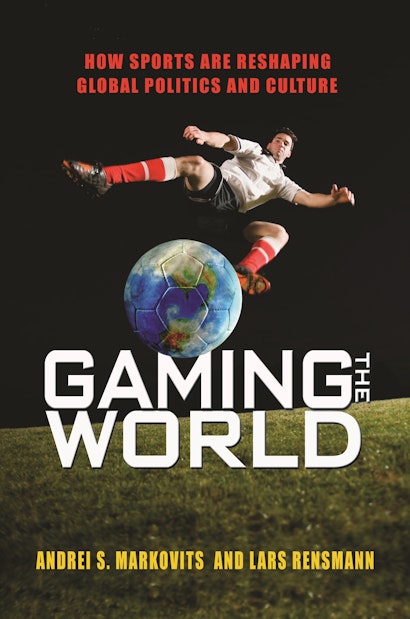Professional sports today have truly become a global force, a common language that anyone, regardless of their nationality, can understand. Yet sports also remain distinctly local, with regional teams and the fiercely loyal local fans that follow them. This book examines the twenty-first-century phenomenon of global sports, in which professional teams and their players have become agents of globalization while at the same time fostering deep-seated and antagonistic local allegiances and spawning new forms of cultural conflict and prejudice.
Andrei Markovits and Lars Rensmann take readers into the exciting global sports scene, showing how soccer, football, baseball, basketball, and hockey have given rise to a collective identity among millions of predominantly male fans in the United States, Europe, and around the rest of the world. They trace how these global—and globalizing—sports emerged from local pastimes in America, Britain, and Canada over the course of the twentieth century, and how regionalism continues to exert its divisive influence in new and potentially explosive ways. Markovits and Rensmann explore the complex interplay between the global and the local in sports today, demonstrating how sports have opened new avenues for dialogue and shared interest internationally even as they reinforce old antagonisms and create new ones.
Gaming the World reveals the pervasive influence of sports on our daily lives, making all of us citizens of an increasingly cosmopolitan world while affirming our local, regional, and national identities.
Awards and Recognition
- One of Financial Times (FT.com)'s Books of the Year in Nonfiction Round-Up in the Sports list for 2010
"This book is a valuable contribution to the burgeoning study of sport in a global perspective. . . . Markovits and Rensmann's erudite analysis presents many of the key issues and offers interesting points to consider as the sports world continues to change at a remarkable pace."—John Harris, Times Higher Education
"[Gaming the World is a] very readable guide to the recent globalisation of sport by academics who understand both US and European sports. Packed with examples, from David Beckham to Kobe Bryant, the book explores the tension between sport's globalisation and the fact that most teams still arouse the greatest emotions in their local areas."—Financial Times
"[Markovits and Rensmann] set forth a number of provocative notions growing out of the internationalization of sports stars and the globalization of soccer (the result, they smartly argue, of Britain's reach in the 19th century)."—David M. Shribman, Bloomberg
"Fascinating on matters both large—the late 19th—century dissemination of newly codified sports from two competing economic and cultural 'cores' (Britain/Europe and North America) to countries around the world—and small: the spread in recent years, from North America to Europe, of the wave, high fives and player tattoos. Best of all is their discussion of how high-end sports have managed to go global, so that Manchester United boasts fans from Beijing to Lima, while maintaining the local identities that give teams their emotional power."—Brian Bethune, Macleans
"Markovits and Rensmann provide a valuable contribution to the literature on global sport. Sports are changing at a remarkable pace, and they provide a way to communicate globally using a common language. Looking at soccer, basketball, football, baseball, and hockey, the authors illustrate the dynamics of change and highlight the influences of globalization at local and international levels."—Choice
"Gaming the World is so well researched and presented that its readers, who will likely already possess a solid base of sports knowledge, will find themselves agreeing with much that is there, nodding along with the revelation of facts and statistics as if they knew them all along. This is to the credit of the authors, as in most cases the depth of the material presented will greatly enrich the reader's understanding of the issues, while also providing a very satisfying confirmation of previously held suspicions. . . . Gaming the World, with its detailed study of how sports affect globalization and how globalization affects the culture of sports, is a broad step forward for this academic discipline as a whole."—Jonathan Lutes, IP Global
"[T]hey are fluent in the language of sport, knowledgeable guides through its history, and thoughtful thinkers about its impact."—Jeremy Schaap, Israel Journal of Foreign Affairs
"[A]n informative page-turner, which will be valuable for scholars of the GDR, graduate students concerned with methodology, and undergraduates studying modern German history."—Peter C. Caldwell, German History
"T]he book merits attention for overdue insights into a brassy, invigorating, and value-shaping facet of contemporary life that too many intellectuals ignore at their peril—one the masses know well enough to take to heart and mind ('the wisdom of the crowd')."—Arthur B. Shostak, European Legacy
"I am thrilled to have read this book because it discusses what I am most passionate about: sports and how their very existence, with soccer as a major contributor, have helped shape history on a global scale. As a player, fan, and ambassador of soccer, I am beyond pleased that the authors give my sport its due. Every soccer person, sports fan, and scholar of sports must read this book."—Brandi Chastain, Olympic gold and silver medalist, Women's World Cup champion
"For those of us turning to the sports page of our daily paper first, here is the book we have been waiting for. Gaming the World offers an up-to-date analysis of the capitalist dreamscape of an important leisure industry. Transformed by globalization, exposed to local and national backlash, marked by American and European exceptionalisms, and rife with symbolic politics, Andrei Markovits and Lars Rensmann argue, we are what we play—contaminated cosmopolitans in a global civilization still tethered to our local and national roots. What fun!"—Peter J. Katzenstein, Cornell University
"This is an exciting book full of stimulating observation and wondrous detail. It illustrates convincingly the central role of sports in our contemporary cultural complex, highlighting their globalizing and cosmopolitan potential but also their national and local reference. The authors bring home their many powerful arguments through a stunning range of evidence."—Modris Eksteins, University of Toronto
"This is a valuable, stimulating, and illuminating book that offers an ambitious, intellectually substantial, analytically sophisticated, and constantly thought-provoking consideration of an important subject. The authors convincingly link their analysis of sports to big questions about the contours, dynamics, and continuing inner tensions of modernity. They also make their subject come alive for the reader. You don't need to be a sports fan to find this book engrossing and enlightening."—Jeff Weintraub, University of Pennsylvania



